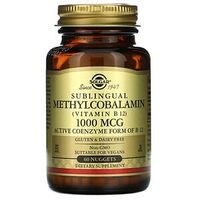Vitamin B12
Other Names: B-12, B12, B Complex Vitamin, Bedumil, Cobalamin, Cobalamine, Cobamin, Cobamine, Complexe Vitaminique B, Cyanocobalamin, Cyanocobalamine, Cyanocobalaminum, Cycobemin, Hydroxocobalamin, Hydroxocobalamine, Hydroxocobalaminum, Hydroxocobemine, Hydroxocobémine, Idrossocobalamina, Methylcobalamin, Méthylcobalamine, Vitadurin, Vitadurine, Vitamina B12, Vitamine B12.
Lack of vitamin B-12 (For example vegetarians) can cause a long list of symptoms :
- Low energy or weakness
- "Brain fog" or lack of focus
- Poor memory
- Light-headedness
- Pale skin
- Sore tongue
- Bleeding gums
- Mood changes or depression
- age-related brain shrinkage
Vitamin B-12 deficiency can also cause neural tube defects in pregnant women Women who are in their menopausal age are slowly becoming aware that they are more prone to weakening and developing porous bones than men. The weakening of bones in women is due mainly to the hormonal changes that are going on inside their body. They are therefore advised to increase their calcium intake. B12 Deficiency Can Strike Anyone, But You Are at Higher Risk if You are over the age of 45, Take acid-blocking medications, Are a vegan or vegetarian, Are or have ever been anemic, Suffer from digestive problems, Have low stomach acid, Take certain diabetes drugs, Drink alcoholic beverages
Contents
Special Precautions of Vitamin B12
- Although vitamin B12 is likely safe for most people, it may cause certain side effects (including diarrhea, blood clots, itching, and severe allergic reactions).
- B12 supplements may interact badly with certain kinds of medications, including: Metformin (a popular diabetes drug), proton pump inhibitors, histamines, and certain antibiotics like Chloramphenicol.
- Combining vitamin B12 with (an antibiotic medication) may produce harmful effects.
- Vitamin B12 should be avoided by people with Leber's disease (a type of eye disease). When taken by people with Leber's disease, vitamin B12 can damage the optic nerve and possibly contribute to blindness.
The benefits and uses of Vitamin B12 are
Vitamin B12 is essential to the very foundation of life itself. It's one of the building blocks your body uses to produce DNA. It keeps your immune system functioning optimally, regulates mood and sleep cycles, and is crucial to energy production, which is why it's known as the "energy vitamin." Vitamine B12 works together with Vitamin B11. So the symptoms often looks like a Vitamin B11 deficiency.
- age-related macular degeneration
- allergies
- Alzheimer's disease
- asthma
- depression
- diabetes
- eczema : When applied to the skin, vitamin B12 may help fight eczema. For a 2004 study from the British Journal of Dermatology, researchers assigned 49 eczema patients to eight weeks of twice-daily treatment with a placebo or a cream containing vitamin B12. By the study's end, those using the vitamin B12 cream had experienced a greater decrease in the severity of their eczema (compared to those using the placebo cream).
- gum disease
- heart disease : Taking vitamin B12 may lower your levels of homocysteine (an amino acid thought to increase heart disease risk when it is present in elevated levels). According to a 2000 report from Seminars in Thrombosis and Hemostasis, daily supplementation with both .5 to 5 mg of folic acid and about .5 mg of vitamin B12 may significantly reduce homocysteine levels.
- inflammatory bowel disease
- male infertility
- osteoporosis
- Vitamin B12 is also used to enhance mood, increase energy, improve memory, stimulate the immune system, promote healthy sleep, and slow the aging process.
- Cancer : Early research indicates that vitamin B12 may protect against some forms of cancer. In a 2003 study from Cancer Causes & Control, for instance, scientists examined the dietary habits of 214 women with cervical dysplasia. (A condition marked by abnormal changes in the cells on the surface of the cervix, cervical dysplasia can lead to cervical cancer if not treated.) Analyzing their findings, the study's authors determined that women who use vitamin B12 supplements and have a high intake of folate, riboflavin, and thiamin may be less likely to develop cervical cancer.
Food sources
- Vegetable sources :
- Brewer's Yeast or Marmite is an excellent source of vitamin B12. Yeast is a single-celled organism that lives on sugars and is used in brewing and baking. When the yeast is grown in an environment with B12 present, it absorbs B12 and holds it within the structure of the organism. Marmite, which is made from brewer's yeast, has substantial amounts of vitamin B12.
- Nori seaweed has been consumed for centuries, and is often thought of as the seaweed used to make Nori rolls (sushi rolls). Because of a symbiotic relationship with B12-producing bacteria, Nori is a good source of vitamin B12. It's one of very few plant based sources of B12. It also contains large amounts of iodine and other trace minerals.
- Spirulina is an algae that is suspected to be one of the oldest living organisms on the planet. It's a species of microscopic plant life called blue-green algae, used in human diets since the 15th century. Along with a high protein value, essential fatty acids and minerals, it has a large amount of vitamin B12 due to its symbiotic relationship with bacteria that produce B12.
- Vitamin B12 is found in high concentrations in red meat and clams. Fish, eggs, poultry and milk also contain significant levels.
| Food | µg vitamin B12/100g |
|---|---|
| Panfried beef liver | 83.1 |
| Simmered turkey giblets | 33.2 |
| Braunschweiger pork liver sausage | 20.1 |
| Raw Pacific oysters | 16.0 |
| Cooked Alaska king crab | 11.5 |
| Raw clams | 11.3 |
| Simmered chicken giblets | 9.4 |
| Cheese | 3.3 |
| Beef (uncooked sirloin) | 1.15 |
| Egg (raw, whole chicken's egg) | 0.89 |
| Whole cow's milk | 0.45 |
| Raw chicken breast | 0.20 |
